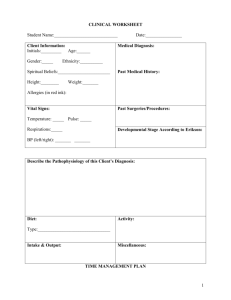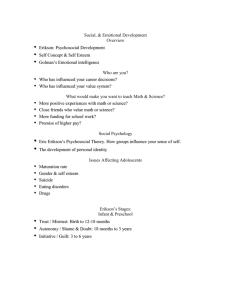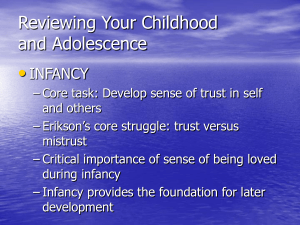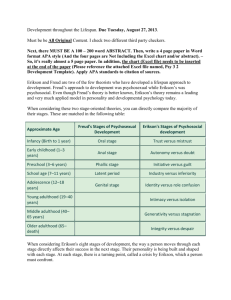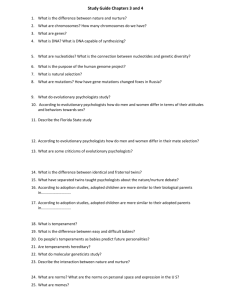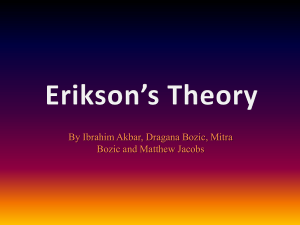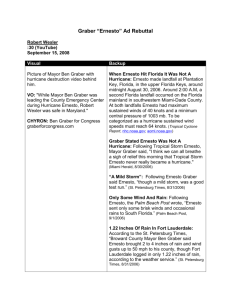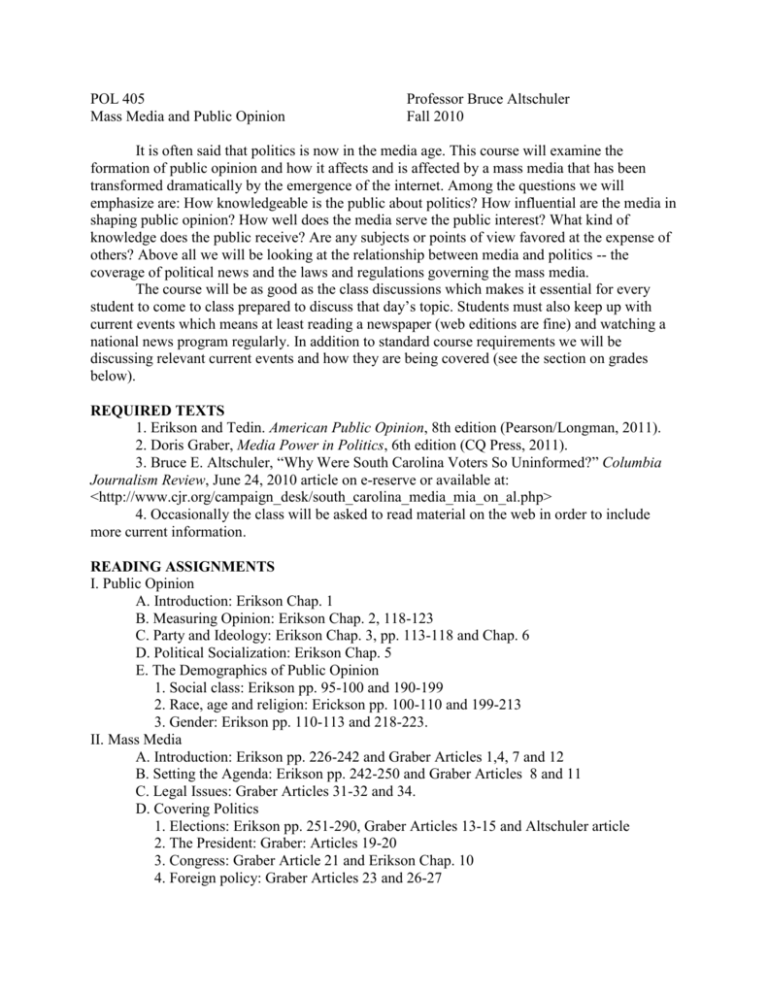
POL 405
Mass Media and Public Opinion
Professor Bruce Altschuler
Fall 2010
It is often said that politics is now in the media age. This course will examine the
formation of public opinion and how it affects and is affected by a mass media that has been
transformed dramatically by the emergence of the internet. Among the questions we will
emphasize are: How knowledgeable is the public about politics? How influential are the media in
shaping public opinion? How well does the media serve the public interest? What kind of
knowledge does the public receive? Are any subjects or points of view favored at the expense of
others? Above all we will be looking at the relationship between media and politics -- the
coverage of political news and the laws and regulations governing the mass media.
The course will be as good as the class discussions which makes it essential for every
student to come to class prepared to discuss that day’s topic. Students must also keep up with
current events which means at least reading a newspaper (web editions are fine) and watching a
national news program regularly. In addition to standard course requirements we will be
discussing relevant current events and how they are being covered (see the section on grades
below).
REQUIRED TEXTS
1. Erikson and Tedin. American Public Opinion, 8th edition (Pearson/Longman, 2011).
2. Doris Graber, Media Power in Politics, 6th edition (CQ Press, 2011).
3. Bruce E. Altschuler, “Why Were South Carolina Voters So Uninformed?” Columbia
Journalism Review, June 24, 2010 article on e-reserve or available at:
<http://www.cjr.org/campaign_desk/south_carolina_media_mia_on_al.php>
4. Occasionally the class will be asked to read material on the web in order to include
more current information.
READING ASSIGNMENTS
I. Public Opinion
A. Introduction: Erikson Chap. 1
B. Measuring Opinion: Erikson Chap. 2, 118-123
C. Party and Ideology: Erikson Chap. 3, pp. 113-118 and Chap. 6
D. Political Socialization: Erikson Chap. 5
E. The Demographics of Public Opinion
1. Social class: Erikson pp. 95-100 and 190-199
2. Race, age and religion: Erickson pp. 100-110 and 199-213
3. Gender: Erikson pp. 110-113 and 218-223.
II. Mass Media
A. Introduction: Erikson pp. 226-242 and Graber Articles 1,4, 7 and 12
B. Setting the Agenda: Erikson pp. 242-250 and Graber Articles 8 and 11
C. Legal Issues: Graber Articles 31-32 and 34.
D. Covering Politics
1. Elections: Erikson pp. 251-290, Graber Articles 13-15 and Altschuler article
2. The President: Graber: Articles 19-20
3. Congress: Graber Article 21 and Erikson Chap. 10
4. Foreign policy: Graber Articles 23 and 26-27
III. Conclusions: How Much Does Public Opinion Count? Erikson Chap. 11 & Graber Article
36.
GRADES
In order to award grades fairly and encourage every student to keep on top of the course
material, grades will be assigned based on the following:
1.EXAMS. There will be two essay examinations. The mid-term will count for 25% of
your grade; the final for 30%.
2. PAPER. Each student will write a short (5-8 pages) paper on a topic to be assigned
later in the semester. This paper will count for 25% of your grade.
3. CLASS PARTICIPATION. At the start of each week’s first class, I will ask if
anyone has read anything interesting relating to the course in the news. I expect each student to
present AT LEAST THREE articles during the semester. All you need to do is give a brief
summary of the article (do not read from it) and tell us what you found interesting and
important about it. This gives you the opportunity to discuss topics you are interested in and
connect the course material to important current events.
In addition there will be regular class discussion of the course material. I expect every
student to keep up to date on the reading and will ask questions about it. In order to ensure that
everyone has a chance to participate, I will call on students whether or not they volunteer.
Class participation of these two types will count for 20% of your grade. This means that
ATTENDANCE IS MANDATORY. Missing a significant number of classes will reduce your
participation grade.
My office is 123 Mahar (phone 3451). I encourage you to stop in to see me if you have
problems, want to discuss anything related to the course, or simply want to talk about something
which you feel is important such as a political event, careers in political science, other courses
etc. If you want to ask me a brief question, send me an email < bruce.altschuler@oswego.edu>
and you don’t have to worry about whether I am in my office when you think of the question.
The Office of Disability Services is available to assist students who have a legally
documented disability or students who suspect they may have a disability. If you have a
disabling condition that may interfere with your ability to successfully complete this course,
please contact the Office of Disability Services. Alternative testing for students with learning
disabilities is available through Disability Services.

